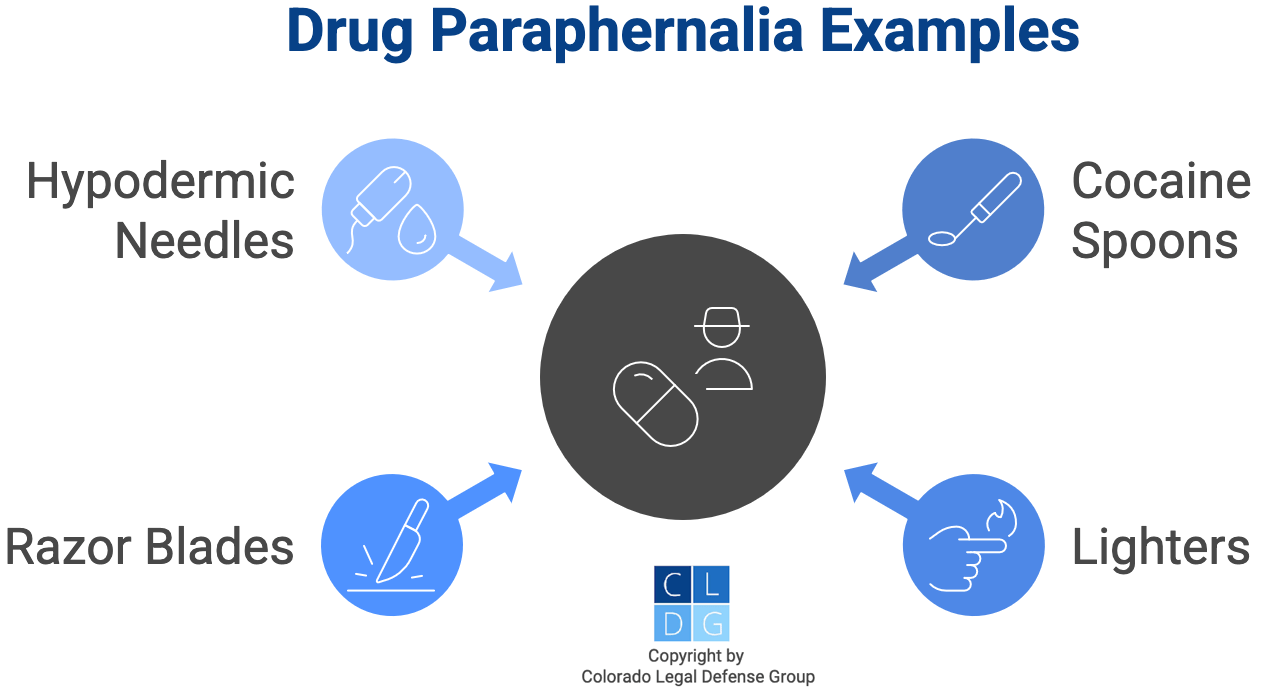Colorado Revised Statutes § 18-18-428 makes it a drug petty offense to possess drug paraphernalia. The penalties include up to $100 in fines but no actual jail time.
CRS 18-18-428 does not prohibit marijuana paraphernalia because state law permits possessing up to two ounces of recreational marijuana to use in private. However, marijuana possession remains a crime under federal law.

In this article, our Colorado criminal defense attorneys discuss the following topics related to drug paraphernalia possession:
- 1. Paraphernalia Laws
- 2. Examples
- 3. Hypodermic Needle Exception
- 4. Defenses
- 5. Record Seals
- Frequently Asked Questions
- Additional Resources
1. Paraphernalia Laws
For you to be convicted of paraphernalia possession in Colorado, prosecutors have to prove beyond a reasonable doubt these two elements:
- You possessed drug paraphernalia; and
- You knew – or reasonably should have known – that the paraphernalia could be used to make, store, use, or ingest drugs.
You are considered “in possession” if you have either:
- actual possession, such as physically holding a meth pipe;
- constructive possession, such as storing hypodermic needles in your closet; or
- joint possession, such as sharing drug containers with a roommate.
Note that it is not a criminal offense to possess paraphernalia for marijuana, marijuana concentrate, or medical marijuana.1

Possessing drug paraphernalia such as methamphetamine pipes in violation of CRS 18-18-428 is a drug petty offense.
2. Examples
In Colorado, pretty much anything counts as drug paraphernalia if the district attorney can prove you used it to help store, use, or process drugs in any way. Examples of drug paraphernalia are:
- scales and balances used, intended for use, or designed for use in weighing or measuring controlled substances;
- blenders, bowls, containers, spoons, and mixing devices used, intended for use, or designed for use in compounding controlled substances;
- capsules, balloons, envelopes, and other containers used, intended for use, or designed for use in packaging small quantities of controlled substances;
- containers and other objects used, intended for use, or designed for use in storing or concealing controlled substances; or
- objects used, intended for use, or designed for use in ingesting, inhaling, or otherwise introducing cocaine into the human body, such as:
- Metal, wooden, acrylic, glass, stone, plastic, or ceramic pipes with or without screens, permanent screens, or punctured metal bowls;
- Water pipes;
- Carburetion tubes and devices;
- Smoking and carburetion masks;
- Miniature cocaine spoons and cocaine vials;
- Chamber pipes;
- Carburetor pipes;
- Electric pipes;
- Air-driven pipes;
- Chillums; or
- Ice pipes or chillers.
Note that for the purposes of CRS 18-18-428, drug paraphernalia does not include marijuana accessories such as bongs, rolling papers, and roach clips.2

Marijuana accessories are not considered drug paraphernalia under Colorado criminal law.
3. Hypodermic Needle Exception
In Colorado, you can be asked if you have a hypodermic needle or syringe prior to:
- an emergency medical technician or other first responder treating you, or
- a police officer searching your person, premises, or vehicle.
As long as you reveal you have needles prior to the search, assessment, or treatment, you may not be charged with:
- drug paraphernalia possession and
- unlawful possession of a controlled substance for any minuscule, residual controlled substance that may be present in a used hypodermic needle or syringe.3

You should not be charged with possessing a hypodermic needle if you disclose it to police or EMT before they search or treat you.
4. Defenses
Here at Colorado Legal Defense Group, we have represented literally thousands of people charged with drug crimes such as paraphernalia possession. In our experience, the following five defenses have proven very effective at getting CRS 18-18-428 charges reduced or dismissed:
- The police lacked probable cause to effect an arrest.
- You were not unaware – and could not reasonably be aware – that the material was drug paraphernalia.4
- The materials were generic (such as a bowl or scale), and you never used them in a drug-related way.
- Law enforcement found the paraphernalia during an unlawful search and seizure.
- You were immune from prosecution because the paraphernalia was a hypodermic needle or syringe that you disclosed ahead of time to the peace officer or EMT.
It is also a defense if you contacted the authorities to make a good faith report of an alcohol or unlawful drug overdose (“OD”), remained at the scene until the police or EMT arrived, and cooperated with them.
5. Record Seals
A Colorado conviction for drug paraphernalia possession can be sealed from your criminal record one year after the case ends. Though if the court dismisses your charge, then there is no wait time before you can pursue a record seal.5

You should not face CRS 18-18-428 charges if you make a good faith report of a drug overdose to police and cooperate with them.
Frequently Asked Questions
What happens if I get caught with drug paraphernalia in Colorado?
Possessing drug paraphernalia in Colorado is a drug petty offense under CRS 18-18-428. You face a fine of up to $100, but no jail time. However, this does not apply to marijuana paraphernalia, which is lawful to possess in Colorado.
How do I avoid getting in trouble if I have needles or syringes?
If you have hypodermic needles or syringes, tell the police officer or EMT before they search you or provide treatment. If you disclose them ahead of time, you cannot be charged with drug paraphernalia possession for those items.
What counts as drug paraphernalia under Colorado law?
Drug paraphernalia includes pipes, scales, containers, spoons, and any item used to store, measure, or consume illegal drugs. However, marijuana accessories like bongs and rolling papers are not considered drug paraphernalia since marijuana is lawful in Colorado.
Can I get this charge removed from my record?
Yes, you can seal a drug paraphernalia conviction from your criminal record one year after your case ends. If the court dismisses your charge, you can pursue a record seal immediately with no waiting period.
Additional Resources
If you or a loved one is struggling with addiction, refer to the following:
- Narcotics Anonymous (NA) – A 12-step program to overcome drug addiction.
- Substance Abuse and Mental Health Service Administration (SAMHSA) – 24/7 treatment referral service.
- Recovery Village – Support group for families of people struggling with drug addiction.
- Drug Addiction – Mayo Clinic article on diagnosing Substance Use Disorder.
- I Need Help With Drug Addiction – Resources provided by Recovery Centers of America.
See our related articles on the unlawful use of drugs and advertising drug paraphernalia (CRS 18-18-430), which is a level 2 drug misdemeanor carrying jail time.
Legal References
- CRS 18-18-428 – Possession of Drug Paraphernalia.
(1)(a) Except as described in section 18-1-711 and paragraph (b) of this subsection (1), a person commits possession of drug paraphernalia if he or she possesses drug paraphernalia and knows or reasonably should know that the drug paraphernalia could be used under circumstances in violation of the laws of this state.
(b)(I) Prior to searching a person, a person’s premises, or a person’s vehicle, a peace officer may ask the person whether the person is in possession of a hypodermic needle or syringe that may cut or puncture the officer or whether such a hypodermic needle or syringe is on the premises or in the vehicle to be searched. If a hypodermic needle or syringe is on the person, on the person’s premises, or in the person’s vehicle and the person, either in response to the officer’s question or voluntarily, alerts the officer of that fact prior to the search, assessment, or treatment, the peace officer shall not arrest or cite the person pursuant to this section for the hypodermic needle or syringe or section 18-18-403.5 for any minuscule, residual controlled substance that may be present in a used hypodermic needle or syringe, and the district attorney shall not charge or prosecute the person pursuant to this section for the hypodermic needle or syringe or section 18-18-403.5 for any minuscule, residual controlled substance that may be present in a used hypodermic needle or syringe. The circumstances described in this paragraph (b) may be used as a factor in a probable cause or reasonable suspicion determination of any criminal offense if the original stop or search was lawful.
(II) Prior to assessing or treating a person, an emergency medical service provider, as defined in section 18-3-201 (1.3), or other first responder may ask the person whether the person is in possession of a hypodermic needle or syringe that may cut or puncture the technician or first responder. If a hypodermic needle or syringe is on the person, and the person, either in response to the question or voluntarily, alerts the emergency medical service provider or first responder of that fact, a peace officer shall not arrest or cite the person pursuant to this section for the hypodermic needle or syringe or section 18-18-403.5 for any minuscule, residual controlled substance that may be present in a used hypodermic needle or syringe, and the district attorney shall not charge or prosecute the person pursuant to this section for the hypodermic needle or syringe or section 18-18-403.5 for any minuscule, residual controlled substance that may be present in a used hypodermic needle or syringe.(2) Any person who commits possession of drug paraphernalia commits a drug petty offense and, upon conviction thereof, shall be punished by a fine of not more than one hundred dollars.
- Same. CRS 18-18-426 (“‘Drug paraphernalia’ means all equipment, products, and materials of any kind that are used, intended for use, or designed for use in planting, propagating, cultivating, growing, harvesting, manufacturing, compounding, converting, producing, processing, preparing, packaging, repackaging, storing, containing, concealing, injecting, ingesting, inhaling, or otherwise introducing into the human body a controlled substance in violation of the laws of this state.”).
- CRS 18-18-428.
- See Lee v. Smith (Colo. 1989) 772 P.2d 82.
- CRS 24-72-701–709.
